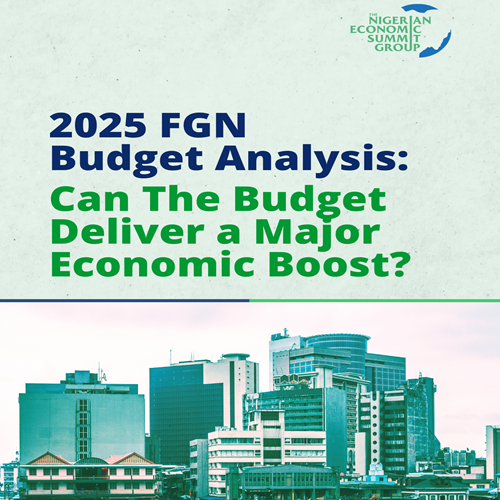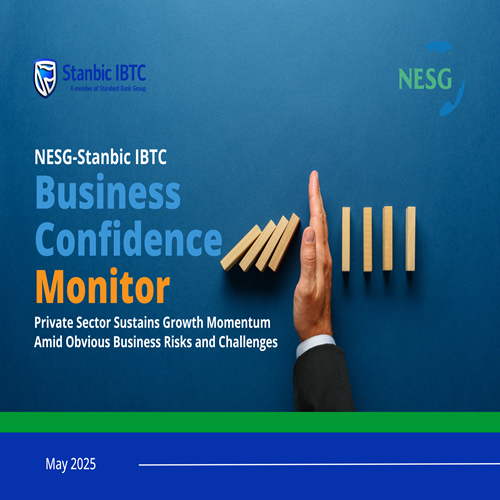Posted Fri, Dec 15, 2023 9:16 PM
NESG Holds CEOs Roundtable for Food Manufacturing Companies on Industrial Food Fortification Compliance and Workforce Nutrition
_1702657018.png)
The Nigerian Economic Summit Group (NESG), on Tuesday, 12th of December, 2023, held a roundtable for Chief Executive Officers (CEOs) on Industrial Food fortification and Workforce Nutrition with the theme "Profitable Protections: The Business Advantage of Industrial Food Fortification Compliance and Workforce Nutrition."
In his welcome remarks, the CEO of Flour Mills Nigeria Plc, Mr Oluboyede Olusanya, who was represented by the Director of Group Strategy and Stakeholders Relations, Mr Sadiq Usman, said that Nigeria has one of the highest rates of malnutrition in the world and it is imperative to acknowledge the stark reality. “Recent data shows that 44% of children under five have chronic, longstanding malnutrition, with 11% diagnosed with acute malnutrition. However, the prevalence of vitamin and mineral or micronutrient deficiencies surpasses these visible manifestations of malnutrition, underscoring a broader and less visible concern,” he stated.
Furthermore, Mr Usman noted that the ripple effect of combating malnutrition extends beyond individual health outcomes; it inherently boosts disposable income within our society. This upsurge in purchasing power translates to increased demand for food products, potentially bolstering profit margins for both large-scale industries and smaller enterprises alike, noting the imperatives of availability, affordability, and nutritiousness in the sustenance of workforce nutrition as a solemn and beneficial commitment by the management of Nigerian businesses to their workers.
While giving opening remarks, the Country Director of the Global Alliance for Improved Nutrition (GAIN), Dr Michael Ojo, said that the economic rationale for embracing food fortification and workforce nutrition is compelling. He noted that for every dollar invested in fortification, Nigeria gains a return of up to fourteen dollars in reduced healthcare costs and enhanced productivity. Furthermore, Dr Ojo noted that the Workforce Nutrition Scorecard, an initiative by GAIN and the Workforce Nutrition Alliance, underscores the importance of nutrition in the workplace and that by addressing malnutrition through initiatives like healthy food availability, nutrition education, and support for breastfeeding mothers, we can significantly improve the productivity and well-being of our workforce. The global working population spends a third of their adult lives at work, and improving access to nutritious meals can profoundly impact health and well-being.
Furthermore, he stated that evidence suggests that improving workers' access to nutritious meals impacts individual-level outcomes (e.g., increased job satisfaction, reduced sick days, increased wage earnings) and business-level productivity outcomes including reduced absenteeism and enhanced productivity.
In his remarks, Senator (Dr) Ibrahim Yahaya Oloriegbe said that a lot still needs to be done to make nutritious foods affordable and accessible to people. “Poor nutrition is more than a healthcare concern; it has tremendous, multifaceted economic implications. Poor diet leads to numerous chronic diseases, often resulting in disability and premature death. This deprives individuals of their health, quality of life, and productive potential, hindering their efforts to work full-time or at all, leading to lower wages. For employers, absenteeism, functional limitations among their employees, and the provision of health insurance pose tremendous costs. Nationally, the quality and quantity of the labour force determine economic output and government revenues. Simultaneously, demands for government resources increase as people incur more significant healthcare costs and become more dependent on assistance when they cannot work. Consequently, poor nutrition is a growing burden for Nigeria,” he stated.
Facilitator of the NESG Agriculture and Food Security Policy Commission, Ms Gloria Ekpo, while giving an overview of the project, said that deficiencies in one or more micronutrients such as iron, zinc, and vitamin A are widespread in low and middle-income countries. These deficiencies compromise the physical and cognitive capacity of millions of people. She recommended the continuous use of fortified food products and products rich in vitamins and minerals. Nutrient-rich food products enhance the nutritional content of meals, address malnutrition issues within the workforce and showcase the organization's commitment to improving the health of its employees. Implement periodic nutrition awareness campaigns through various channels and engage professional nutritionists to conduct training sessions.
During the panel session, Senior Programme Manager, GAIN Dr Oluwatoyin Oyekenu said that government should look to reducing price differentials in fortified products, the digital fortification policy assessment traceability platform where fortification quality data is made available to government and producers in real-time. While speaking in the same vein, the founder of the Food Agriculture Nutrition Network (FANN), Dr Olapeju Phorbee, said that malnutrition affects people, but the ultimate impact is reflected in consumers. There should be responsiveness to our challenges and compliance at the factory level, but assessments need to go beyond factories. Research institutions should know what happens along the product value chain, regularly evaluate household products and research fortified products.
Find a blog post
Latest Releases

2025 FGN Budget Analysis: Can Th .. Read
1 week ago

NESG Stanbic IBTC Business Confi .. Read
1 day ago

Engagement Towards a Successful .. Read
5 days from now
